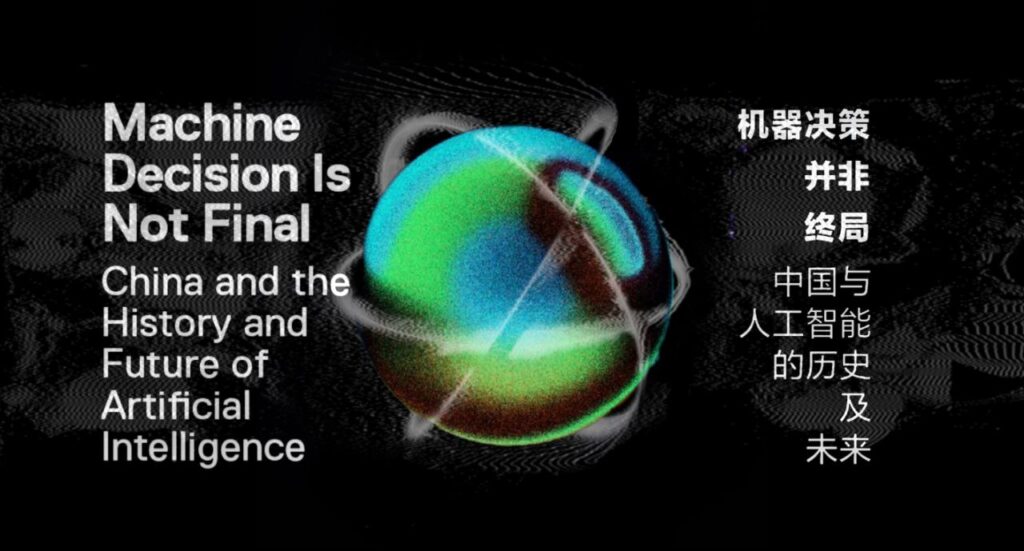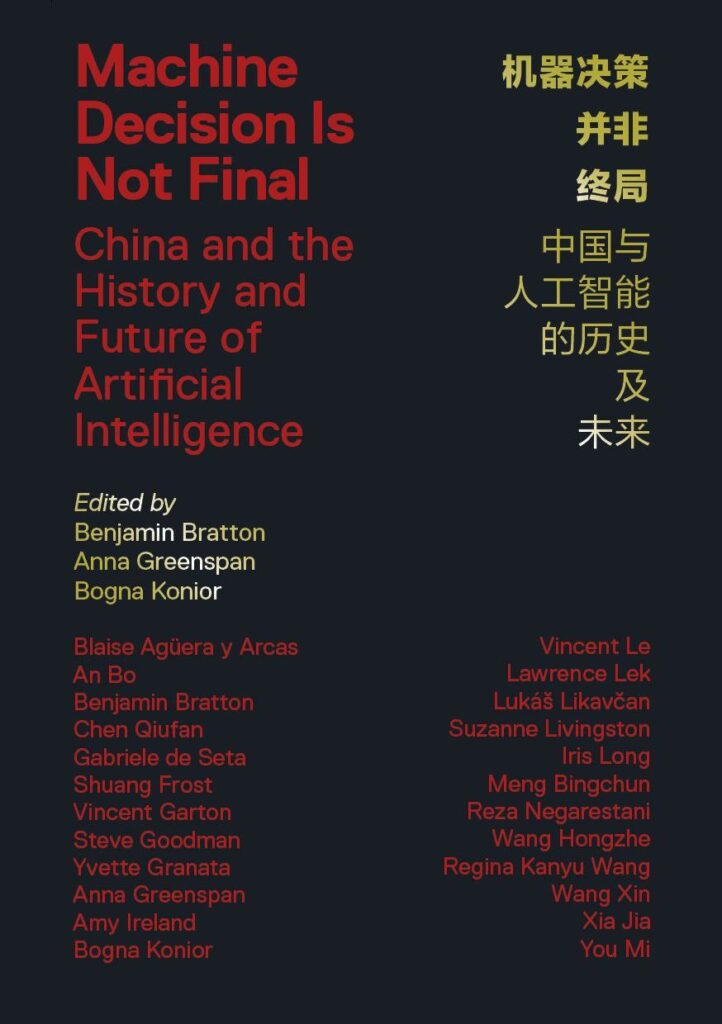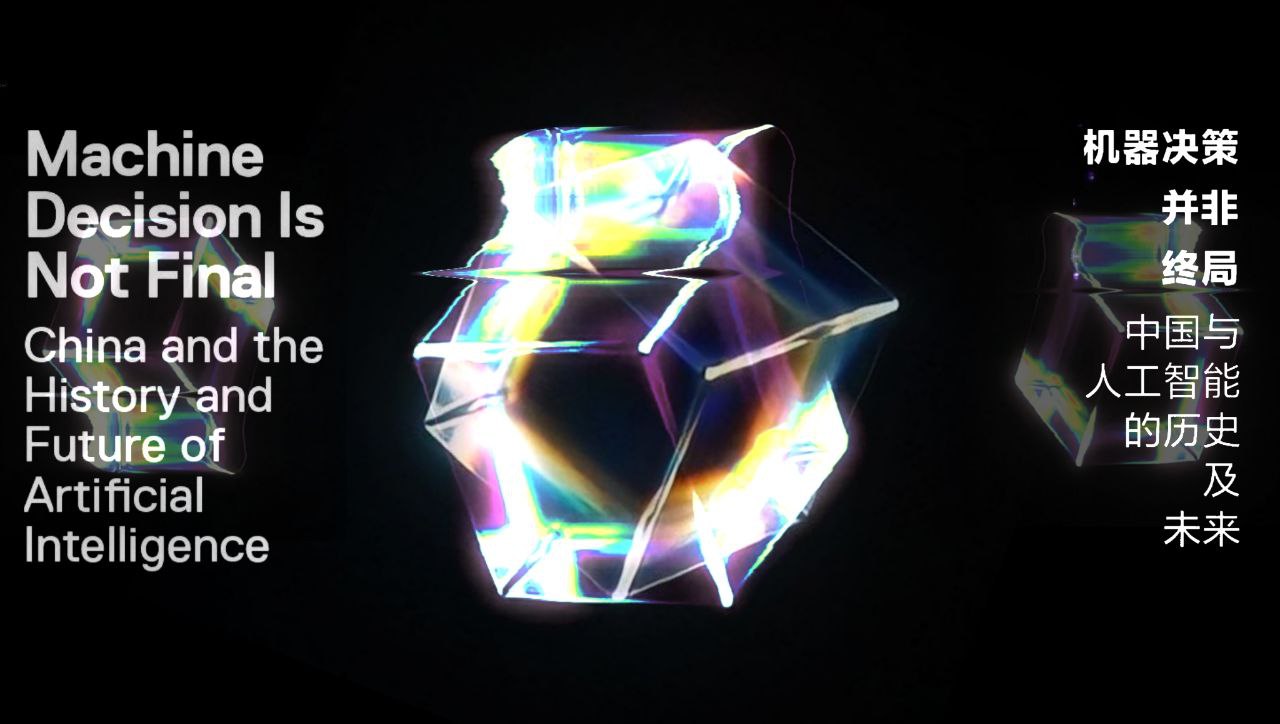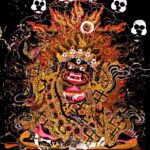“Spanning borders between different worlds, histories, futures, and foundational models, Machine Decision is Not Final is not only a timely reappraisal of the stakes of AI development, but a tool for constructing more global imaginaries for the future of AI.” This Fall, Urbanomic will release Machine Decision is Not Final, an interdisciplinary and cross-cultural collection edited by Benjamin Bratton, Anna Greenspan and Bogna Konior. Seeking a fresh perspective on what artificial intelligence is today and what it might become, Chaosmotics, in collaboration with Urbanomic, is publishing a series of preview excerpts throughout the week.
_____________________
Translating Chinese AI: From “Human-made Intelligence” to “Black Tech”’
Shuang Frost
The Chinese term for Artificial Intelligence, rengong zhineng (人工智能), was originally introduced to China via Japan in the mid-twentieth century as a localisation of the Japanese term jinkō chinō (人工知能). Whereas the first element of the English compound ‘Artificial Intelligence’ clearly implies artificiality and perhaps even artifice—that AI is something alien to humanity—the Chinese and Japanese phrases harbour no such association. Rengong zhineng and jinkō chinō translate most faithfully as ‘human-made intelligence’. The first half of each double compound is composed of two characters 人, literally person or human, and 工, work or labour. These characters define AI as a product of human creation and link it to an entirely different constellation of associations. We can sense the effect of this shift in orientation in popular discourse. There is, for example, a Chinese saying which states that many of the products currently being marketed as AI involve more rengong, manual-labour,than zhineng, intelligence (e.g. many ‘AI-enabled technologies’ currently rely on armies of human workers to manually code data and process information instead of machine-learning algorithms). [1] Such playful language is deeply revealing. It shows how the concept of rengong zhineng in Chinese is intrinsically centered on the human. […]
In a recent episode of Qipashuo, a popular Chinese debate show, contestants were presented with the following prompt: ‘If there existed a “black technology” that would enable a person to trade a portion of their life for money, ought we collectively permit it?'[2] […] In English the term ‘black technology’ evokes images of digital markets for untraceable transactions, omnipresent control systems, and other dystopic technologies placed in the service of immoral ends. But in the Sinosphere (the linguistic space of Chinese-language discourse), ‘black technology’ is a concept with overwhelmingly positive connotations. First popularised around 2016, the year that AlphaGo defeated Go master Lee Sedol in the legendary human-versus-machine game, the term refers to those transformative technologies—AI foremost among them—that are believed to hold the potential to radically reshape society in collectively desired ways. […] In order to make sense of this evocative term and its counter-intuitive associations, it is helpful to explore how ‘black technology’ was introduced into and was re-invented within the Chinese cultural context.
The phrase first appeared in Japanese as burakku tekunoroji ブラックテクノロジ, a Romanji rendering of the English words ‘black’ and ‘technology’. This compound was coined by Shoji Gatoh, author of Full Metal Panic!, a serial light novel and anime series [3]. In the fictional world of Full Metal Panic!, burakku tekunoroji refers to a class of technologies so advanced that they exceed present human comprehension. These include both futuristic forms of real-world technologies, such as artificial intelligence, as well as mythical ones, such as the ‘Fairy’s Eye’ and the ‘Electronic Concealment System’. [4] Gatoh juxtaposes burakku tekunoroji with the term haiteku ハイテク, from the English ‘high-tech’, to distinguish it from ordinary technologies that exist at or near the edge of the current technological frontier. Haiteku or high-tech is presentist in its orientation. In both English and Japanese, the phrase is generally invoked either in reference to the most advanced forms of technology presently available or to those technologies which have existed for many decades, but are just now beginning to find widespread application (e.g. carbon nanotubes, which were discovered in 1952, but have only recently been used to produce carbon fibre objects for mass-consumption). Burakku tekunoroji, by contrast, shifts the frame of reference away from the present and into the future. It is used to convey the incomprehensible power of unknowable, almost mystical technologies as well as their unbounded potential for creation and destruction. The Chinese term heikeji (黑科技), a direct translation of burakku tekunoroji, retains from its Japanese progenitor connotations of ineffable power but these are stripped of the corresponding existential concerns. As the 2018 annual report of the Chinese National Linguistic Committee (an entire section of which was dedicated to explicating the meaning of ‘black technology’) explained, the hei (black) in heikeji (black technology) falls outside of any existing meaning of the term ‘black’ in modern Chinese, which ranges from ‘dark’ and ‘hidden’ to ‘illicit’ and ‘evil’. On the contrary, it signals an intensely positive outlook towards the future; heikeji refers to conceptual technologies with immenselytransformative potential that are ‘difficult to realise at the present moment but could be realised in the future’. [5]
________________________________________________________________________
[1] During my fieldwork in China, I have often heard industry experts invoke the saying ‘rengong zhineng doushi rengong, meiyou shenme zhineng’ (人工智能都是人工,没有什么智能), which translates as ‘Artificial Intelligence [Rengong zhineng ] is all human labour [rengong] and no intelligence [zhineng ]’.
[2] Qipashuo is a TV program produced by Ma Dong, founder and CEO of Mewe. seven seasons spanning 2014–2021 have been aired. The show has become a cultural phenomenon in China: it produced 1,179 trending phrases that are rated ‘top searches’ on the Chinese internet. And its viewership attained No. 1 in language-related shows and top 3 in general entertainment shows. Data from ‘Data Will Tell You: The Cultivation of Qipashuo in Seven Years’ [数据告诉你,《奇葩说》的七年之’养’], 9 March 2021 <https://new.qq.com/omn/20210309/20210309A04XJV00.html>.
[3] フルメタル·パニック! [Full Metal Panic!], written by Shoji Gatoh and illustrated by Shiki Douji, published between 1998 and 2011.
[4] In the series, haiteku were created by a sub-race of humans, known as the ‘Whispered’, who were created as a result of scientific experimentation and whose existence is unknown to the general population. Some Haiteku later entered the world and became commonplace without civilians knowing their origins as a ‘black technology’.
[5] National Language Working Committee [国家语言文字工作委员], ‘Report on Chinese Linguistic Life, 2018 [中国语言生活状况报告2018], <http://www.xinhuanet.com/politics/2018-05/30/c_1122909806.html

Mou Zongsan and AI Ethics
Anna Greenspan
Norbert Wiener, reflecting on the cultural consequences of the new science of communication and control in his last book God & Golem, Inc.: A Comment on Certain Points Where Cybernetics Impinges on Religion, warned that the literal-mindedness of cybernetic machines was analogous to the demonic dangers of magic. ‘The reprobation attaching in former ages to the sin of sorcery,’ he wrote, ‘attaches now in many minds to the speculations of cybernetics.’ [1] Wiener illustrates this by referring to Goethe’s poem ‘The Sorcerer’s Apprentice’ in which an inexperienced wizard conjures up a magical broom that can assist him with his chores. The young sorcerer activates his enchanted item, confident that he can relax, as he now has a tool that will obey all his commands. Yet, he is driven into a frenzied panic trying to stop it when the automated cleaner, for whom a room is never clean enough, starts drowning the house in streams of water. Wiener ponders worryingly the ominous idea that magic ‘grants you what you ask for, not what you should have asked for or what you intend.’ [2] He turns to the classic horror fable The Monkey’s Paw, in which a poor family is granted three wishes. They first wish for money, which comes in the form of insurance for their son who has tragically died. They next wish for their son to return, but when he comes home, it is only to haunt them as a ghost. Terrified, they use their final wish to banish their lost son’s phantom.[3] Cybernetic machines, he warns, operate in a similar fashion: ‘Set a playing machine to play for victory, you will get victory [without] the slightest attention to any consideration except victory according to the rules.’ [4]
As the title of his book suggests, these morality tales that trouble Wiener, intimately entangled with questions of discipline and restraint, are embedded in a very specific philosophical and conceptual domain—that of Abrahamic religion. In the Abrahamic religions, from the moment Adam and Eve eat the apple, the problem of knowledge and disobedience are intertwined. For Weiner, the resulting dilemma of how to balance intelligence and control is a feature, not a bug of monotheistic tradition. But what happens to questions of AI ethics if, following the lead of philosophers such as Yuk Hui, we shift perspective and employ an altogether different cosmological approach? [5]
________________________________________________________________________
[1] Norbert Weiner, God & Golem, Inc.: A Comment on Certain Points Where Cybernetics Impinges on Religion (Cambridge Massachusetts: MIT Press, 1964), 60.
[2] Weiner, God & Golem, 71.
[3] In his essay ‘Y2K Positive’, Mark Fisher describes this literalness with reference to the millennial computer glitch Y2K. Mark Fisher, ‘Y2K Positive’, Mute (January 2004)<https://www.metamute.org/editorial/articles/y2k-positive>.
[4] Wiener, God & Golem, 71
[5] See Yuk Hui, ‘On the Limit of Artificial Intelligence’, Philosophy Today 65 (2):339–357 and The Question Concerning Technology in China (Falmouth: Urbanomic, 2016).Also see Bing Song, ‘Introduction: How Chinese Philosophers Think About Artificial Intelligence?’ in Intelligence and Wisdom (Singapore: Springer, 2021), 1–14.








